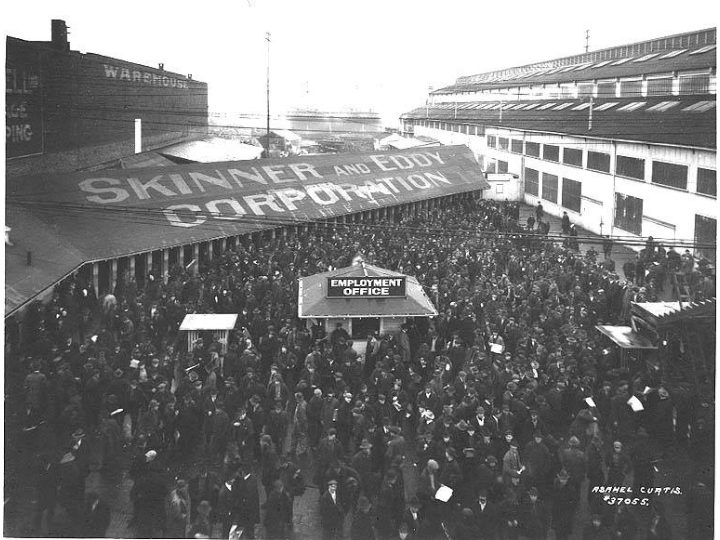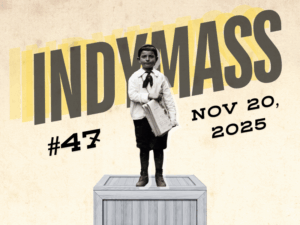Big ups for Rep. McGovern and Jon Keller discussing what was once undiscussable in Bay State media, but a few historical corrections are in order
What a sign of the times: A sitting congressman and a veteran political journalist having a conversation about organizing a national strike—that is, a nationwide general strike of working people—aimed at toppling the Trump administration. Yet that’s precisely what was recounted in Jon Keller’s recent MASSterList column revolving around his interview with Rep. Jim McGovern (D-Mass.).
“The courts have slowed down the oncoming freight train. But we wondered: what happens if, as Trump world is already suggesting, they just ignore the courts and keep the wrecking ball swinging?
“‘Then we have a full-blown constitutional crisis, and I think it requires some dramatic action in response,’ says McGovern. ‘We can’t just sit back and let our democracy just fall apart. What we need to think about are things like maybe a national strike across this country.’”
Keller has a record of doing what few other journalists do in this era, paying attention to organized labor. McGovern has one of the best pro-labor voting records in Congress, his unfortunate vote in favor of imposing a pro-boss settlement on 115,000 unionized railroad workers to prevent a nationwide strike in 2022 excepted.
But I’ve never seen two mainstream Massachusetts public figures almost casually talking over precisely the kind of grassroots democratic outcome that the “minimum program” mobilization strategy I supported in my last column could lead to.
Keller then doubled down by referring to the epic May 1968 general strike of students and workers across France:
“A national strike? Better buckle your seat belts.
“That tactic –- shutting down a wide swath of the economy to force change in government policies –- is not unknown abroad. There’s one on tap this week in Greece, where public and private sector unions are banding together in protest of alleged government malfeasance. Mention May 1968 in Europe and they’ll recall the massive strike in France which led to President Charles de Gaulle fleeing the country as his government collapsed.”
Followed by this statement, “There hasn’t been anything approaching that here in the U.S. since 65,000 union workers and sympathizers in Seattle staged a five-day work stoppage over wage issues in 1919.”
Keller concluded by boosting United Auto Workers President Shawn McFain’s proposal “to time their contract expiration dates for April 30, 2028 in anticipation of a May Day general strike demanding Medicare for All and other social reforms.”
Totally an A for effort for John Keller with this one. However, as the resident socialist political columnist hereabouts, I would be remiss if I didn’t correct the historical record somewhat in support of his column’s overall thrust.
First, the May ‘68 strike in France did not cause the government led by President Charles de Gaulle to collapse—though it came close to doing so. He did briefly flee to Germany on May 29, 1968 to rally the support of the loyal French military units stationed there and elsewhere should they be required to invade their own country to keep him in power, then immediately returned. If he had called a national referendum at that point, as he considered doing, he might have been ousted. But instead he called a national election the next month and his forces won a resounding victory. During the weeks just prior to the election, his government crushed left-wing opposition in the streets, ironically helped by the actions of a timorous French Communist Party that backed his call for elections over the heads of the strike leaders to its left.
Though de Gaulle remained personally unpopular and indeed resigned from office the next year, many historians and political analysts across the political spectrum believe that the strike strengthened the conservative government of his Union for the Defense of the Republic party (after the events of 1968 renamed to the Union of Democrats for the Republic) and kept left-wing politics off the national agenda until President François Mitterand’s Socialist Party government came to power in 1981. Only to have the Mitterand government move rightward and impose neoliberal anti-worker reforms within a few years.
Second, we’ve had many citywide and regional general strikes and several national strike waves in US history. Were any of these close to a national strike? I’d say yes, but not quite at the level of 1968 in France (and elsewhere, actually). Here’s a list:
- 1824 Pawtucket Mill Strike
- 1834 & 1836 Lowell Mill Girls Strikes
- 1835 Philadelphia General Strike
- 1872 New York City Eight Hour Day Strike
- 1886 Eight Hour Day Strike Wave (including the Haymarket Massacre)
- Great Southwest Railroad Strike of 1886
- 1877 St. Louis General Strike
- Great Railroad Strike of 1877
- 1892 New Orleans General strike
- Pullman Strike of 1894
- Philadelphia General Strike of 1910
- 1912 Bread and Roses Strike
- Colorado Coalfield War of 1913-1914
- US Strike Wave of 1919 (including the Seattle General Strike of 1919)
- Battle of Blair Mountain (1921)
- US Strike Wave of 1934 (including the Minneapolis General Strike of 1934, the 1934 West Coast Waterfront Strike, the US Textile Workers Strike of 1934, the Toledo Auto-Lite Strike of 1934, and many others)
- Flint Sit-Down Strike of 1936-1937
- Little Steel Strike of 1937
- Great Strike Wave of 1946 (including the 1946 Oakland General Strike)
- 1970 Postal Workers Wildcat Strike
- Teamsters Wildcat Strike, 1970
- Miners Strike of 1977-1978
- 1983 AT&T Strike
- 1997 United Parcel Service Strike
I would also point out that significant strike waves happened right here in Massachusetts over the last two centuries other than the 1830s Lowell strikes and the 1912 Lawrence strike—including shoe worker and leather worker strikes, notably the General Strike (or “Great Strike”) of 1933 in Peabody’s brutal leather factories that my grandfather Nicholas Pramas helped lead. Over 5,000 leather workers, mainly immigrants from several nations, most of whom lived right near their factories, participated and unionized half of the leather companies in Peabody with strong support from workers in other industries, small businesses, houses of worship, and key public officials in a city of 21,000 people at the time. I plan to write more about that struggle in the future. And I definitely want to dive into the UAW’s 2028 “grand unified labor contract” proposal in more detail sooner rather than later.
Keller and McGovern are quite right, however, local, regional, sectoral, and ultimately national general strikes represent the combination of labor action and civil disobedience, the kind of “democracy from below,” that can drive the oligarchs out of our current government and perhaps one day out of American politics entirely. Which is why such “technofeudalists” hate labor unions and the broad political left so very much and hope to stop them from rising in this country and worldwide ever again.
The question remains: Will millions of Americans and immigrants to our shores unite and fight the billionaires’ growing control over every aspect of our lives? Can mutual aid and solidarity among working people prevail over the runaway capitalism that has engulfed both major US political parties and has pushed one, the Republicans, toward outright fascism?
I would like to think the answer is yes. But a quick spin through the history of the labor struggles listed above makes it quite clear that it’s not going to be easy going. Not at all.
Apparent Horizon—an award-winning political column—is syndicated by the MassWire news service of the Boston Institute for Nonprofit Journalism.








